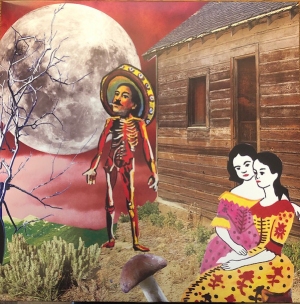
Silkworm’s In the West originally came out on CD and cassette on Seattle’s C/Z Records in 1994. I don’t recall specifically when or where I picked up a copy, but I can feel the accumulated grime on my fingertips from flipping through CD bins searching for it, triggering a Pavlovian response to go wash my hands. In the West lingers in that context, the feverish nightmare of its cut-and-paste cover art sharing an early-’90s aesthetic with countless other denizens of those bins, even as its contents far surpassed its now-forgotten neighbors. A quarter century after its initial release, Comedy Minus One honors In the West with its first-ever vinyl pressing, updating elements of its cover art but retaining the unsettling spirit of the original, blackened layer of dust not included.
This half-measure feels appropriate, as In the West deserves to be brought into 2019 but cannot be fully extracted from 1994. “Dated” is typically derogatory, but context is not, and In the West benefits from understanding its place within Silkworm’s development. After working through a series of demo cassettes during their infancy in Missoula, Montana and move to Seattle, Silkworm released their debut album L’ajre in 1992, followed by a string of seven-inch singles and the …His Absence Is a Blessing EP. There are flashes of excellence during those early years, later collected by Matador in the 2CD Even a Blind Chicken Finds a Kernel of Corn Now and Then: ’90–’94, particularly Tim Midyett’s affable “Slipstream,” Andy Cohen’s defiant “Scruffy Tumor,” and Joel R. L. Phelps’s reference-setting cover of The Comsat Angels’ post-punk classic “Our Secret,” but as the compilation’s self-effacing title acknowledges, they hadn’t figured it all out yet. In the West is the first point when their various influences and individual songwriting voices congealed into a whole, a process that would be furthered just eight months later with the release of its follow-up, Libertine (which is also once again on vinyl via CMO) then blown up by Phelps’s departure.
A congested timeline to be sure, but In the West was a significant milestone. Recorded by fellow Missoula native Steve Albini (dutifully uncredited), stylistically it bears far closer resemblance to early ’80s post-punk, like Mission of Burma or the aforementioned Comsat Angels (Waiting for a Miracle, Sleep No More, and accompanying singles only), than most of their contemporaries. I doubt their adopted homebase of Seattle did them any critical favors; In the West had just enough early-’90s scuzz in its guitar tones for unfocused scribes to absentmindedly sort them into the grunge pile, where their songwriting approaches would be decidedly out of place. (Not that critics, then or now, always bother to differentiate who’s singing which songs.)
The most nagging detriment of In the West’s 1994 date stamp has thankfully been corrected: the remix/remaster job for this reissue is a night-and-day difference from its original release, which suffered from era-typical muddiness and a thin mix that shackled drummer Michael Dahlquist’s considerable power. Starting with 1996’s Firewater, Silkworm’s albums carried a reference-quality combination of space, punch, and clarity—exemplars of Albini’s “the sound of a band in a room” engineering ethos—and this update brings In the West in line with those later recordings, which is no minor achievement. In the West is a dramatically different experience with a palpable rhythm section. It officially sounds like a Silkworm album, not a dry run at one.
In the West, then and now, is a uniquely dark album in Silkworm’s catalog, equally explosive and implosive. With the possible exception of its predecessor L’ajre (I’ll take the zero on the homework of revisiting that album), In the West is Silkworm’s heaviest guitar rock record, with Andy Cohen and Joel R. L. Phelps frequently churning thick chord progressions into clouds of noise, a practice that Libertine largely abandons. These storms are dynamically balanced with unsettling lulls, passages where the guitars vanish and minimalism takes over. There are deep-rooted melodies on most songs, but the up-tempo tracks skew more rocking than overtly catchy, with no earworms like Libertine’s “Couldn’t You Wait” or Lifestyle’s “Treat the New Guy Right.”
Typical to Silkworm’s democratic principles, In the West features a nearly even split between the three songwriters, but my reductive take on their respective approaches—Tim Midyett as the introspective, casually funny romantic, Cohen as the black-humored, semi-historical storyteller, Phelps as the nervy font of psychodrama—hasn’t quite settled yet. Midyett’s four songs are caught between Missoula and Seattle, youth and adulthood, with “Garden City Blues” ruminating on the mixed feelings of a return home, rousing from quiet reservations to unencumbered emotions. “Punch Drunk Five” evokes Montana in the final few lines of its hormonal rave-up, while the rocking “Incanduce” flits between staying, going, returning, and running away before being overcome a monstrous, low-slung riff. The most atypical Midyett contribution is the eight-minute “Enough Is Enough,” which gradually arcs from whisper to roar along with its uncomfortable lyrics about a pushy date. There are moments of humor in these songs, most notably the exasperated “Aw Jesus Christ!” in “Punch Drunk Five,” but Midyett’s search for himself and/or someone else tends to be lonely, over-excited, or frustrated, not poised. The stellar “Garden City Blues” is his best song on In the West, in possession of perspective rather than in pursuit of it.
In one sense, the quick synopsis of Andy Cohen’s songwriting applies to his trio of songs here: pitch-black humor coats almost every line (“Go into the woods and live with the bears / That way you can kill someone and nobody cares,” “Then I grabbed a drowning man / I used him for a raft”), loose narratives put Cohen’s voice in violent, unsavory characters, and why yes, that is a reference to General Pershing in “Dust My Broom.” In another sense, they leave you wanting more than the synopsis: Cohen improved dramatically over the next few albums in his ability to imbue potentially unlikeable characters with affecting depth (see Firewater’s trio of “Slow Hands,” “Tarnished Angel,” and “Don’t Make Plans This Friday”). This concern doesn’t matter much for “Dust My Broom” and “Into the Woods,” whose riffs scorch the earth like Sherman’s March to the Sea, but the slow-boiling “Parsons” never leans out of the lyrical darkness and is most compelling during its instrumental bridge.
It’s impossible to overstate the degree to which Joel R. L. Phelps ratchets up the intensity level on In the West; whether quietly repeating a line in a shell-shocked trance or howling loud enough to wake the neighborhood, Phelps commands dramatic tension like few other songwriters. “Raised by Tigers” (which I wrote about more extensively at One Week // One Band) condenses a wartime novella about the younger brother left at home into five masterful minutes. The initially sparse “Dremate” takes heart-on-sleeve to the utmost extreme, turning over the promise “Bare to you my heart” and its myriad ramifications before bursting into flames with the screamed refrain “Say that you will.” The bass-driven post-punk of “Pilot” closes In the West in an intriguing way, given the hair-raising climaxes of Phelps’s other two songs. The lyrics give full warning of what might come—“When I collide it will be something to remember / When I fall from the light it will be something to remember”—but even as Phelps teases a full-out yelp in the final minute, he pulls back, teetering on the precipice of that fall. Instead of the mammoth chords that shook many of the preceding songs, dual leads snake over the bridge, with Phelps’s wordless vocal accompaniment a welcome touch. Phelps excels on In the West at establishing and maintaining this unblinking level of intensity, but an entire album in this headspace would be draining. Phelps’s songs benefit from the shorter, punchier tracks like “Into the West” and “Incanduce” elsewhere on In the West; on Libertine and his solo / Downer Trio records, his wider range of approaches heightens the truly bristling moments.
To my knowledge, there’s no established hierarchy for Silkworm albums, no consensus ranking. You get to Silkworm albums when you get to them, and getting them doesn’t necessarily mean getting them. It took years (and the life experience acquired during those years) for me to fully appreciate Firewater, which finally clicked and became one of my favorite Silkworm records. Ranking them according to a perceived objective sense of quality misses the point: Libertine is a different experience than Firewater, which is a different experience from Developer, and so on, and the greatness of Silkworm comes from the range of those experiences. There are days when Lifestyle is my favorite Silkworm album and days when It’ll Be Cool is my favorite Silkworm album. This reissue puts In the West fully in the conversation. The songs were always there, but that old mix? It was work, a smudged lens distorting artistic intent. Now In the West is on a level playing field, and I understand its experience in a way that I hadn’t previously. It’s a darker, heavier experience than its brethren, and there will be days when that experience fits and days when it doesn’t. But 25 years after its release, and probably 20 after I first heard it, I get In the West. Maybe there’s still hope for L’ajre.
A valuable postscript: Almost two hours of bonus material is included in the digital download for In the West, and while little of it qualifies as essential listening for people who don’t self-identify as Silkworm devotees, that tag absolutely fits me and my appetite for ephemera, demos, and live recordings. Phelps’ rendition of the Christina Rossetti-penned Christmas carol “In the Bleak Midwinter” and Midyett’s yearning, “UK Surf”-esque alternate take on “Incanduce” (Dahlquist wrote on Silkworm’s web site “I think we tried to play quiet to mock some asswipe club owner, played ‘Incanduce’ in this sort of American Music Club way, and liked it enough to record it”) originally appeared on seven-inches and then Even a Blind Chicken, so they are both the best and most familiar tracks included here. (“Midwinter” is a precursor to Phelps’ more recent contributions to Comedy Minus One head Jon Solomon’s WPRB Xmas marathons, a few of which are available here.) There’s a raucous live rendition of The Dream Syndicate’s “Halloween.” Five songs are represented via seven direct-to-DAT demo recordings from 1991, including a pair of hyperspeed run-throughs of “Dust My Broom.” There are six individual live songs and a full 1993 set from Chicago’s venerable Lounge Ax, and the performances resonate through the mixed recording quality.
|
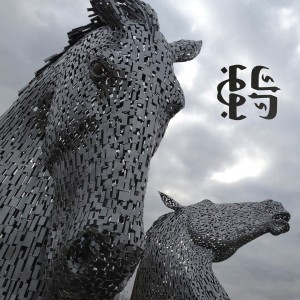
The only problem—if it qualifies as such—to Bottomless Pit’s otherwise flawless discography to date is insularity. Familiarity with Tim Midyett and Andy Cohen’s previous band Silkworm has been a borderline prerequisite. There are rewards to this condition: comparing and contrasting Hammer of the Gods (2007), the Congress EP (2008), and Blood Under the Bridge (2010) with Silkworm’s extensive catalog enlightens both sides of the equation, since every aesthetic shift is deliberate and carefully chosen, like Bottomless Pit’s signals to the melodic post-punk of early New Order. The lyrical connection is even more significant. Midyett and (to a lesser extent) Cohen have used Bottomless Pit’s music to reconcile their grief over the tragic passing of Silkworm drummer Michael Dahlquist. Bottomless Pit would not exist without Dahlquist’s passing, a truth those records cannot forget. For card-carrying members of Silkworm’s slowly expanding cult following, Bottomless Pit’s songs are immediately devastating, but my concern is whether this insider-oriented dialogue, coupled with the group’s downright inscrutable branding, has turned three of the finest rock records of the last decade into invite-only affairs.
Shade Perennial addresses that concern with a deft achievement: it opens the door, musically, lyrically, and even logistically to newcomers without compromising what made Bottomless Pit such a valuable proposition. Collecting their previous recordings (along with three unreleased tracks) in the Japanese import Lottery 2005–2012 offered Bottomless Pit a clean break in their discography, less a new chapter and more of the next book in the series, and they took full advantage of it. You can pick up Shade Perennial (issued via Comedy Minus One, marking the first time the group hasn’t self-released reference-quality 45 RPM vinyl) and not feel like you’re entering the middle of a conversation, or at least the seemingly private one I described earlier.
The conversation dominating Shade Perennial does not require an invitation. Tim Midyett, Andy Cohen, bassist Brian Orchard, and drummer Chris Manfrin have a chemistry that’s beyond second-nature. There are no clashes over territory: a rare democracy balances Midyett’s baritone guitar surges with Cohen’s chord slashes and strafing leads, and they’ll open up space for Orchard and Manfrin on quieter moments like “Full of Life.” Don’t mistake this observation for minor praise: you don’t get the subtle emotional shading and dynamic arcs of “Fleece,” the swaggering melodic exchange of “Incurable Feeling,” or the sun-peeking-through-the-clouds illumination of “Horse Trading” without completely dismissing egos. And yet for all of this emphasis on shading and detail, Shade Perennial offers some of Bottomless Pit’s most immediate songs to date, especially Andy Cohen’s trio of up-tempo rockers.
The biggest shift on Shade Perennial is in the songwriting department. You still get two distinct, equally compelling lyricists, but Midyett and Cohen’s respective approaches have evolved since Blood Under the Bridge. Most strikingly, no song on Shade Perennial reads as a rumination on the aftermath of Michael Dahlquist’s passing, whereas that topic hung over their first three records. When Midyett invokes King Poseidon in the opening "Fleece," the shift in perspective is jarring. It’s still a personal song, but there’s a creeping darkness (“You can hurt me but you don’t”) that was previously absent from his generally optimistic humanism. It isn’t until the rolling, six-minute closer “Felt a Little Left” that Midyett sounds embodies the eminently likeable Midyett of old, and the repetition of “I know I know I know” practically recognizes it. Cohen takes the opposite tact, further softening his once-contentious approach with an affecting delivery on “Null Set” (“Forgot about you / Myself too”) and poetic imagery in “Sacred Trench” (“They were just shadows”). He still explores atypical relations with humorous barbs (“Shoot the duck and you will win / What we do is like that stupid game / I honestly think I’m too straight to follow”), but at long last, it’s plausible that Cohen himself is the character being studied.
I recognize the apparent irony: even as I argue that Shade Perennial is less insular, less dependent upon Bottomless Pit’s history than its predecessors, I can’t avoid bringing up that history. View this impulse not as an invalidation of my thesis, but as another reward to any new listeners the album invites to the Silkworm/Bottomless Pit narrative. There is a rich history here—a towering stack of records you’ll have to pry from my cold, dead hands; an innate musical discourse within the group that can only come from Midyett and Cohen's 25 years of collaboration; two songwriters with distinct, constantly evolving voices—and Shade Perennial succeeds as both a standalone document and a gateway to what precedes it. Just remember, you don't need to hear all of the records at once.
|
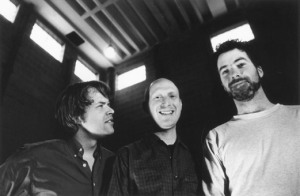
I’m excited to report that I’ll be over at One Week // One Band until Friday writing about the songs of Silkworm. By all means head over there! In between my posts, check out their archives, to which many writers I respect and enjoy have contributed. Many thanks to Hendrik for this opportunity.
If you’re coming from One Band // One Week and wondering “Who’s this guy writing about Silkworm? Is he ever going to stop? Does he write about any other bands?” here’s a quick sampling of the better work I’ve done in recent years.
The Ten: J. Robbins: A run-through of ten of my favorite compositions he’s written as the frontman of Jawbox, Burning Airlines, Channels, and now Office of Future Plans.
The Ten: Girls Against Boys: A sampler platter for their double-bass assault.
Discographied: Sonic Youth: Catching up with the storied noise-rockers’ canon proves insightful and exhausting. Part one. Part two. Part three. Part four.
Discographied: Mogwai: One of the most prominent post-rock bands (who insist they’re not a post-rock band) offers fifteen years of notable releases and occasionally essential extras to track down.
Covering the Smiths: I convince my best friend, a Smiths fanatic, to endure eighteen covers of “Please, Please, Please, Let Me Get What I Want” from artists like Muse, Hootie & the Blowfish, Third Eye Blind. Yes, we’re still on speaking terms.
If you’re somehow still craving more, I recommend clicking through my year-end lists in the masthead and checking out the nowhere-near-comprehensive New Artillery Index. Thanks for reading!
|
Tre Orsi – Devices + Emblems LP – Comedy Minus One, 2010
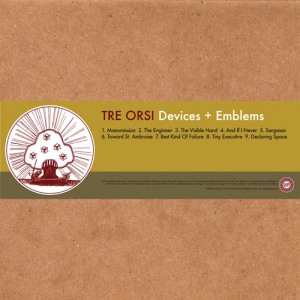
It’s both easy and dangerous to go overboard on the relevance of a group’s influences or reference points (whether acknowledged or perceived), but Tre Orsi’s relationship with Silkworm and Bedhead explains what makes them a compelling band on their own accord. The bullet points of this relationship are clear. Tre Orsi’s first released song was a bravado cover of Silkworm’s “Insomnia” for the 2006 tribute album An Idiot To Not Appreciate Your Time: The Songs of Silkworm, which re-imagined Andy Cohen’s buzzing guitar work as restrained piano. Tre Orsi’s Matthew Barnhart helped record The New Year’s last two albums, a favor which Bubba Kadane returned by producing Devices + Emblems. Barnhart’s done live sound and tour management for both groups. Few recent bands can claim such a symbiotic relationship with their touchstones. It puts Tre Orsi in the unique position of being the descendents of Silkworm and Bedhead and the peers of Bottomless Pit and The New Year.
But does Tre Orsi sound like Silkworm and Bedhead? In a general indie rock sense, sure. Like Silkworm and countless other bands, they have a guitar/bass/drums line-up with an emphasis on replicating their live sound. Vocally, Barnhart can occasionally be mistaken for the lost third Kadane brother, but his band is two guitarists short of Bedhead’s clean, three guitar arrangements. What Tre Orsi picks up from those groups is an emphasis on honest, carefully crafted songwriting that forgoes fashionable, fleeting trends in favor of lasting impact. Granted, the sexiness of now is more immediately satisfying, which led me to sit on particular Silkworm recordings and most of Bedhead’s catalog until the light went on in my head and made wonder how I’d ever not counted Firewater as one of my personal favorites or spent more time with Transaction de Novo. Needless to say, this object lesson in patient listening comes a lot easier for me at 30 than it did at 17.
My immediate reaction to Tre Orsi’s Devices + Emblems was informed by these experiences. The first time I heard it, I wasn’t blown away, but I knew there was something I enjoyed that would continue to grow, so I kept coming back. Every time I’ve listened to it since (especially my first spin of the LP), Devices + Emblems has gotten better. It’s now in regular driving rotation, which is the mark of a strong, long-lasting rock album. Getting to that point shouldn’t happen immediately for an album loaded with enjoyable left-turns. You need to figure out where those turns take you first. Clear starting point “The Engineer” (which previously appeared on Gerard Cosloy’s labor-of-love compilation of Austin-area bands, Casual Victim Pile: Austin 2010) winds its way through a windmill guitar and air-drum friendly intro, a nicely cresting verse, a cathartic pre-chorus (“I hate all these thoughts / I composed in foreign language”), a charging, energetic chorus (“I give to you / Philosophy / Before I die / Right here, stateside”), a ragged solo, and finally a reflective outro that revisits the previous lyrics. I had to understand this topography before I could sing along and air drum as I speed down 93 to the city, but that’s an enjoyable process on its own accord. Other highlights include the stomping drums and buzzing arpeggios of “Toward St. Ambrose,” the head-bobbing chorus of “Tiny Executives,” and the distorted squeals of “Best Kind of Failure,” but there isn’t a disappointing track in the lot.
True to the no-bullshit ethos that runs through every note of Tre Orsi’s music, Devices + Emblems is a tidy nine songs, twenty-seven minutes. Every time the final notes of “Declaring Space” close out the record, I hope a few more songs magically appear, but I’m limited to the equally excellent “The Illustrator” b/w “Faulkner’s Blues” single and that “Insomnia” cover. Now my edict for patience becomes doubly important, since music as carefully crafted as Tre Orsi’s doesn’t write itself overnight, so their now anxiously awaited second album may be a few years away. It’s here where I’d like them to be more Silkworm/Bottomless Pit and less Bedhead/The New Year.
|
Bottomless Pit – Blood Under the Bridge 2LP+CD – Comedy Minus One, 2010 – $20

I decided to go two routes with this review for an obvious reason. The second route is really long.
The short version: Bottomless Pit adds to their flawless track record with another superb release. Expanding on the surging melodies of the 2008 Congress EP, Blood Under the Bridge returns to straightforward Silkworm-esque rock in “Summerwind,” “Late,” and “Is It a Ditch,” explores mellow ground on “Rhinelander” and “Q.E.D.,” and closes with a searing Andy Cohen solo in the towering “38 Souls.” Book this album for the highest reaches of my year-end list, mirroring the positions of Hammer of the Gods and Congress.
The long version: Bottomless Pit is an incomparably personal band. Each release reflects upon the key fact of the group’s existence: without the reckless vehicular homicide that took the life of Michael Dahlquist, Tim Midgett and Andy Cohen would still be releasing new Silkworm albums every two years. Instead they chose to forge ahead with a new outfit, swapping Midgett’s sharp, expressive bass lines and Dahlquist’s thunderous kick drum for Midgett’s new baritone guitar, bassist Brian Orchard’s deep, minimal lines, and former Seam drummer Chris Manfrin’s dexterity and precision. The change in rhythm section character would speak volumes if Midgett and Cohen didn’t actively address Dahlquist’s passing in their lyrics. Midgett is often hauntingly direct: “When you get it in your mind to live again” from “The Cardinal Movements,” “You were a king when you knew what you were worth” from “Human Out of Me,” “People are frightening / When they don’t got a reason to live” in “Pitch.” Cohen opts for veiled storytelling, contributing “Dead Man’s Blues” to Hammer of the Gods and noting how “Nothing is sadder than chasing a ghost” in “Fish Eyes.” Both approaches are gut-punches.
Yet to listening to Bottomless Pit in the sole context of Michael Dahlquist’s death ignores the universality of their lyrical themes. Similar to how Fugazi succeeds at making politically charged rock by avoiding explicit details, Bottomless Pit adds an abstracted level of catharsis to accompany the autobiographical reading. Is a specific song—the astounding “Leave the Light On” from Hammer of the Gods, for example—about Dahlquist, Midgett’s mindset, or just a general feeling? To my ears, all three are present. This ability to translate personal experience into commentary on the human condition is all too rare.

It’s not as if Silkworm lacked this capacity. Midgett’s “Xian Undertaker” from It’ll Be Cool stares death in the face and offers a knowing smirk. Cohen’s “Don’t Make Plans This Friday” from Firewater captures moments of fleeting brilliance in suffocating discontent. I could go on and on. (Seriously: Go get Firewater, Lifestyle, It’ll Be Cool, and Libertine. For starters.) The difference is that Bottomless Pit’s album-to-album development is intertwined with a sense of personal progression that acts as a frame of reference for each song, each album. When the regret and subcutaneous tension of Hammer of the Gods blossomed into the resiliency of Congress, I felt both a profound sense of optimism from the songs (especially “Red Pen”) and a strange pang of relief that Tim Midgett was less consumed by grief within them. This developmental arc points in multiple, often divergent paths on Blood Under the Bridge, which prevents me from coming up with a single-line summary for how it shifts from the thematic base of Congress. That makes Blood harder to nail down, but by no means diminishes the returns.
The first two songs are deceptively nonchalant, starting with the feel-good rhythm and intertwined guitar melodies of the seven-minute-long “Winterwind.” Tim Midgett’s lyrics encourage a fresh start: “Waiting on deliverance is just like waiting on a tree / That you can’t get out from under / Get out from under it now.” A familiar riff trickles in during the song’s lengthy outro: a guitar part from Silkworm’s “Bar Ice.” It still throws me for a loop, a glance back at the past even as the lyrics encourage a step away. You still get that step away with the mellow introspection of the percussion-free “Rhinelander.” Midgett’s line that “There’s no such thing as too much time” makes me long for more time with the idyllic guitar interplay, not regret missed opportunities or time wasted.
Andy Cohen’s “Summerwind” breaks the calm by spinning the elliptical refrain “It’s not nothing I would do again” over jagged chords. “We lost it all and started fresh” stands out from the hypothetical lyric sheet (although “I saw the devil on a commuter train” is classic Cohen), applying just as easily to a failed romantic relationship as his old band. The up-tempo swing continues with “Late,” a brisk rocker that pulls Midgett out of distanced contemplation with a downright angry chorus of “So many fuckers in this world / To line up / And trade for you.” The album’s middle point, “Dixon,” is a Southern rock instrumental, an enjoyable lark that wouldn’t have seemed plausible on either of Blood’s predecessors.
Blood downshifts over its next few songs. Midgett’s mid-tempo “Kiss Them All” ruminates on its refrain, “I’ve been waiting on the real you all along,” then lingers on an extended, drum-focused outro. Cohen’s “Is It a Ditch” fuels his nimble riffing with a twinge of reticence. Midgett’s “Q.E.D.” returns to the dreamy contemplation of “Rhinelander,” ambling through some heady territory with “Always shit to do / When I’m dead I will still have a list / But sometimes things just feel complete.” His wordless coos and Chris Manfrin’s intricate shuffle elevate the song from those idle thoughts.

Blood Under the Bridge closes with Cohen’s “38 Souls,” a howling storm of distorted riffs, spine-chilling vocals, and passionate soloing. The song begins as one of his darkly comic narratives—“I had collected 38 souls / Needed two more to reach my goal / What good are they anyway / Left them stacked up in the foyer”—but ratchets up the intensity with the powerful delivery of “When I woke up they were gone / I had to let them get away.” Turning that couplet into an imperative (“When I wake up they’ll be gone / I have to let them get away”) underscores the desperation in his voice. Cohen has mostly avoided his penchant for ragged, cathartic solos in Bottomless Pit, but the scorched-earth solo he plays on “38 Souls” instantly joins his highlight reel (along with “Don’t Make Plans This Friday” and “Tarnished Angel” from Firewater). “38 Souls” is a visceral, devastating assault, one Bottomless Pit was wise to put at the end of the album.
There isn’t a song on Blood Under the Bridge that I don’t enjoy, but how they fit together is less obvious than it was on Hammer of the Gods or Congress. “Dixon” felt out of place on the first few spins. “Rhinelander” and “Q.E.D.” seemed overly muted, especially in comparison with the blazing intensity of “38 Souls.” As I spent more time with the songs, the path from Congress to Blood became clearer. Blood takes firm steps in new directions, but still looks over its shoulder at the past, which appears in the recall of Silkworm’s “Bar Ice” in “Winterwind,” the fiery solo of “38 Souls,” and lyrical references to Dahlquist both oblique and explicit. The thoughts of both singers wander, but Blood starts with Midgett’s imperative (“Get out from under it now”) and ends with Cohen’s (“I have to let them get away”). “Easier said than done” is the clichéd moral, but as anyone who’s lost a loved one will attest, those memories continue to pop up at unexpected, affecting times. They will certainly pop up when listening to Blood Under the Bridge, a testament to Bottomless Pit’s foremost strength: translating their own experiences into humanistic rumination of the highest order.
If you live in Pittsburgh, Boston, New York, or Columbus, you have a chance to see Bottomless Pit this weekend on an increasingly rare outing from their home base of Chicago. I’m looking forward to catching them on Friday for the first time since an excellent 2008 show with Chris Brokaw and the Kadane Brothers. If not, you can order their three albums direct from the group or from Comedy Minus One. The vinyl pressings are about as nice as it gets—45 rpm LPs, thick gatefold sleeves for the full-lengths—and include a copy of the CD.
|
Wye Oak – My Neighbor / My Creator CD – Merge, 2010 – $8 (Show at the Middle East Upstairs, 9/2)

Here’s some excellent advice: Go see Wye Oak live. Don’t wait a few years like I did; see them the next chance you get. While I’ve enjoyed the Yo La Tengo / Folksongs for the Afterlife back-porch charm of their two full-lengths, 2007’s If Children (2008 Merge pressing) and 2009’s The Knot, they’re a different act live. Jenn Wasner’s weathered voice is enchanting and empathetic, removing a bit of the restraint she shows on their records. The jagged soloing and reverbed chords of her guitar work makes me long for a Wye Oak live album. Drummer Andy Stack pulls double duty by playing the bass lines on keyboard with one hand. And these aren’t simple, held-note bass lines—they sound natural, like they have an honest-to-goodness third member up there. Certainly check out their records, but recognize that Wye Oak’s unrelenting forward momentum means you’ll hear better versions of earlier songs and new material that improves upon the old when you see them live.
It’s hard, then, to hit pause on their evolution and rewind to this EP, which was first available back in March, but My Neighbor / My Creator deserves attention. Five songs, including a remix of The Knot’s “That I Do,” might seem slight on paper, but the four new songs rank among Wye Oak’s finest moments. “My Neighbor” demonstrates the combination of tricky guitar riffs and inviting vocal hooks that made The Knot memorable, but finds its missing ingredient in the occasional levity of If Children. “Emmylou” proves they can tackle alt-country at higher speeds just as well as the ambling tempo of The Knot’s devastating “Mary Is Mary.” “My Creator” adds wheezing organs and tape effects, but it’s the nimble arpeggios and focused songwriting that keep me coming back. As for the Mickey Free version of “I Hope You Die,” I would not have anticipated the addition of police sirens, synth bass, skittering sound effects, and (most shocking) Free’s own rapping, so you can't call it predictable.
I have to go back to my previous comment about “better versions of earlier songs” for the best track from My Neighbor / My Creator. The live take of the affecting “I Hope You Die” casts aside the keyboards and saxophone of the EP version for a more typical transition from solo guitar and voice to fiery, Andy Cohen-esque soloing. (Side note: If you’re unaware of my fondness for the guitar work Andy Cohen of Silkworm/Bottomless Pit, this is mammoth praise, even if Wasner's still developing her style. “Don’t Make Plans This Friday” and “Tarnished Angel” have two of my favorite solos ever.) What makes this transition work is resonance of the material. “I Hope You Die” offers a remarkably open tale of (I assume) Wasner’s mother’s illness. There’s both poetry—“At the ringing of a bell / Or at the falling of a tree / If you think of it at all / Remember me / Just me”—and exasperation—“Against your will / You are alive”—in the lyrics. The overwhelming catharsis on stage is such a natural amplification of these emotions. That performance has been stuck in my gut for a month. The original is still wonderful, but it’s hard to go back.
In line with their rapid release schedule, Wye Oak is recording a new album now. I was treated to a few tracks from it, most notably “Holy Holy.” The majority of the song is a likable, mid-tempo strummer, but at 4:25 of this clip Wye Oak kicks it into another gear. Between Wasner’s ascendant vocal melody and the anthemic guitar work, this part of “Holy Holy” reminded me of catching new songs from my favorite bands on 120 Minutes back in the ’90s and rewinding the tape over and over to burn the good parts into memory. It’s a hell of a teaser for Wye Oak’s third album.
There isn’t an official release date for that album yet, but Wasner did mention that it will be the first Wye Oak album pressed on vinyl. (They did have a split seven-inch for Record Store Day 2008 with Destroyer.) Wasner also discussed the possibility of The Knot getting a vinyl pressing for Record Store Day 2011, so hopefully Merge will apply some of the considerable Arcade Fire cash to that deserving cause. In the meantime, track down this EP, view Wye Oak’s superlative cover of the Kinks’ “Strangers” in the AV Club’s Undercover series, listen to their covers of “Dance My Pain Away” and “Black Is the Color of My True Love’s Hair,” and check out their upcoming tour dates with David Bazan. It's quite a to-do list.
(One final note: Found this and couldn't pass up sharing it: Wye Oak and the Supernaturals covering Talking Heads' "Naive Melody (This Must Be the Place)," one of my favorite songs.)
|
|
I hadn’t planned on doing any record shopping during a one-day trip to Manhattan, but when the free Polvo/Obits show at the Seaport was moved over to the Brooklyn Bowl, I found myself strolling through Williamsburg with time to kill. I briefly visited Academy Records’ Manhattan location last fall during a similar day trip to NYC, but I don’t remember that location being anywhere near as stocked as this one. (If memory serves, I only purchased a copy of Faith No More’s The Real Thing for $5 on LP.) Perhaps bolstered by hipsters selling their LP collections for a given night’s PBR intake, Academy in Williamsburg had a solid array of vinyl, especially in the just-in bin. Pricing was mixed; bigger names like the Smiths, the Clash, and Joy Division tended to be overpriced, less iconic artists like those I purchased were reasonable, and lower profile records were downright cheap. I anticipate being down in the city (growing up a few hours north of NYC means that “the city” will always apply to New York, even though I’ve spent considerably more time in Chicago and currently live near Boston) a few times over the fall, so I’ll be sure to spend more time combing through their used bins for Adlai Stevenson speech compilation LPs.
I’d passed on a copy of Depths at In Your Ear in Harvard Square for $20 a few weeks back, so being able to get both of these LPs for that price seemed like a logical compromise. I put aside Squirrel Bait, Caesura, and Sonora Pine LPs, so if you’re looking for a copy of Sonora Pine II on vinyl, they should still have two.
108. Silkworm - Lifestyle LP - Touch and Go, 2000 - $8

Although I’ve made no secret of my affinity for Silkworm (or Midgett and Cohen’s current outfit, the similarly excellent Bottomless Pit), I suspect that I might have given Lifestyle the short shrift on this website. Placing 2004’s It’ll Be Cool in the upper reaches of my top 40 of 2000 through 2004 wasn’t a regrettable decision on its own regard, since that album certainly holds up and contains some of their finest songs (“Don’t Look Back,” “Xian Undertaker,” “Shitty Little Yacht”), but Lifestyle deserves similar consideration, if not a higher overall placement. (Especially since Do Make Say Think got three albums in the top fifteen.) I’ll contend that all of the post-Phelps Silkworm albums are a touch unassuming, since their style of power trio, classic-rock-informed indie rock preceded more hip applications of that era. Lacking the retro orientation and NYC swagger of the Strokes and the boozy Replacements homage of every Hold Steady song, the musical and lyrical sincerity of Lifestyle will never be mistaken for sexy, but classic? I’ll vouch for that.
Lifestyle is the most explicit classic rock album in Silkworm’s discography and not just because of the cover of the Faces’ “Ooh La La” that appears on its back-end. These twelve songs are instantly digestible and permanently resonant for a number of reasons—short running times, yearning melodies, Tim Midgett’s small town, blue collar lyrics—but foremost is the comparatively muted musical palette. It sounds like it could have come out in 1970. Lifestyle doesn’t feature any of Firewater’s dramatic guitar solos, doesn’t creep into the spacious confines of Developer’s quieter moments, doesn’t venture into It’ll Be Cool’s instrumental variety. (I won’t bother to compare it to the grunge-era bluster of the Phelps albums.) The album title is particularly a propos, since these songs feel so comfortable in their skin. Between Andy Cohen’s evocation of Jean-Luc Godard’s Contempt and Tim Midgett’s strangely romantic acoustic ode “Bones” (“We’re all gonna live a long time before we go”), Lifestyle touches upon the past without being limited to it. Side A outshines side B by a touch, since it features Cohen’s humorously touching “When you run into the night / Ain’t you ever been alone in your life? / Motorhead is coming for you / You gotta treat the new guy right” chorus in “Treat the New Guy Right” and Midgett’s affecting “Time’s passed / I’m becoming a man” realization in his Missoula memoir “Plain,” but listening to the album again dispels my notion that it suffers from a Developer-styled frontloading. All of these songs are above average and most are downright great. Its musical restraint is perhaps antithetical to the indulgences typical to 1970s classic rock, but Lifestyle simply feels classic in a way that few contemporary albums do. I can’t see it becoming dated in ten, twenty, or thirty years. I can only see it getting better and better.
109. Windy & Carl - Depths 2LP – Kranky, 1998 - $12
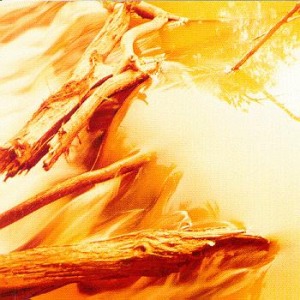
I enjoy Windy & Carl, but my existing stock of 1997’s Antarctica EP (their contribution to Darla’s Bliss Out Series) and 2001’s clearer Consciousness seemed sufficient for the last eight years. The epic title track of Antarctica garnered 90% of my listens, so why mess with a good thing? Yet given my increasing appreciation for ambient releases from Brian Eno, Last Days, and Kranky standbys like Stars of the Lid, Labradford, and the Dead Texan, I figured it was time to revisit W&C’s guitar-based drones, especially the heralded Depths.
I certainly got my money’s worth with Depths, with three songs stretching past thirteen minutes and all seven lasting for almost seventy. Two of the shorter songs, “Set Adrift” and “The Silent Ocean,” stand out, with the former’s guitar tones achieving supreme bliss and the latter’s submerged vocal melodies calling for excavation. I could do without all fifteen minutes of “Aquatica,” since it lacks textures interesting enough to merit its runtime, but the other six tracks certainly accomplish their intended aim of thoroughly zoning me out. I prefer the wavering, gauzy sonics found here over the occasionally crystal clear separation of Consciousness; while it’s nice to know what Windy and/or Carl is doing in a given song, I’d prefer not to be confronted with the specifics.
|
|
I was disappointed to learn that the Fremont location of Sonic Boom Records closed in February, since it had a vinyl annex that provided me with two Lungfish LPs in my previous trip to Seattle. The vinyl annex was divided up between the remaining stores in Capitol Hill and Ballard, which helped bolster this store’s stock. No jaw-droppers, but a number of nice finds. Bonus points for nice employees who played the Jealous Sound’s Kill Them with Kindness and talked about how they’d recently gotten into the now-disbanded Aereogramme. I wish the staff at Newbury Comics in Harvard Square played older records more often instead of their usual hip new bands, but I imagine you sell more records their way.
28. Don Caballero – For Respect LP – Touch & Go, 1993 – $9

Between Don Caballero and Thee Speaking Canaries, I’ve written quite a bit about Damon Che lately, but I hopefully haven’t exhausted my reserves of 1990s math-rock banter. For Respect is comprised primarily of short, forceful songs, many not passing the three-minute mark, which comes in stark contrast to their later efforts. I tend to prefer the longer tracks like “Well Built Road” and “New Laws” that stretch out and explore a few different moods, but the shorter tracks show some variety, like the aptly titled “Subdued Confections.”
What stands out is how “traditional” the guitars sound in comparison to what Ian Williams and Mike Banfield throw together for 2. I use traditional with no slight to the technical accomplishments here, but these songs use beefy chord progressions and more typical lead lines, not the finger-tapped leads, feedback bursts, and disorienting chord battles of their next record. (The air raid siren effect that begins “Dick Suffers Is Furious with You” is still terrifying.) In retrospect it’s amusing how long it took for other math-rock groups to make that transition, since For Respect, not 2, is the blueprint for most 1990s math-rock, but that’s why they’re the Don.
29. Bedhead – WhatFunLifeWas LP – Trance Syndicate, 1993 – $9
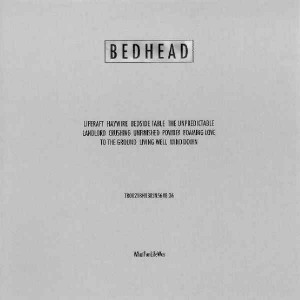
The subtlety and low-key nature of the Kadane Brothers took ages to grow on me, but after seeing The New Year open for Bottomless Pit last year, I was finally converted. I’ve been working backwards through their catalog, progressing from The New Year’s solid self-titled LP to their excellent The End Is Near (the anti-title track “The End’s Not Near” is astonishingly good) to their debut, Newness Ends, which I had apparently purchased on CD when it first came out. Taking the next step back to Bedhead was harder, since Transaction de Novo was my stumbling block for years, but I’ve found similar rewards with their releases. Transaction balances Seam-like indie rock (“Psychosomatica”) with their signature slow crawl (“Lepidoptera”) better than I remembered.
I hadn’t made it back to the beginning when I found this copy of their debut LP, but I didn’t know whether Touch and Go had recently repressed the vinyl or if this was a lingering copy of the original Trance Syndicate pressing, so I snapped it up for a cheap nine bucks. (Trance Syndicate ended around the time of the big Butthole Surfers / Touch and Go feud, but I’ve seen plenty of copies of the self-titled Trail of Dead LP floating around lately.) WhatFunLifeWas isn’t too far off from Transaction de Novo. It betrays a larger debt to the Velvet Underground, occasionally thrashes about (“Haywire”), and lacks some of their carefully arranged guitar patterns, but it’s a Kadane Brothers album through and through. The production sounds close to Seam’s gloriously fuzzy The Problem with Me, but it never comes off quite as wistful as Sooyoung Park’s group.
30. Mr. Bungle – Disco Volante LP – Plain, 2008 (1995) – $17
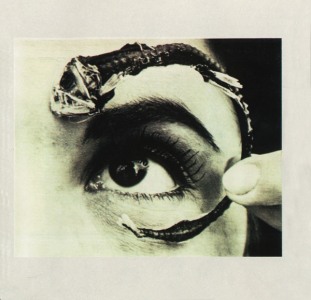
Fun fact: I remember seeing the original pressing of Disco Volante (with the bonus 7”) during one of my first trips to Reckless Records, but scoffed at the $18 price tag. Whoops. It rocketed up to $70 to $100 on eBay shortly thereafter. I’d waited patiently for this reissue to come out, so I gladly did my double-dipping duty when I found it in Seattle. Smart move, right?
Wait a second, there’s another pressing of this reissue LP with the bonus 7” included? That one’s colored vinyl, too. I can’t justify triple-dipping, even with a premier reissue pressing floating around. Screw you, Plain Recordings.
Disco Volante is certainly the most challenging Mr. Bungle album, veering between dramatically different styles and approaches, but it’s hard to call it my favorite. I have to be in a very particular mood to hear “Violenza Domestica,” for instance, whereas I can play California in most mental states. Hopefully that album will earn a vinyl pressing to coincide with the reissues of Mr. Bungle and Disco Volante, since I’ll gladly own all three.
31. Tar – Toast LP – Touch & Go, 1993 – $5

I was indirectly familiar with Tar because of their split single with Jawbox, in which they covered each other’s songs (Jawbox’s cover of “Static” appears on My Scrapbook of Fatal Accidents), but Tar’s history leaves little doubt to their aesthetic. Having released albums on both Amphetamine Reptile and Touch and Go, I expected aggressive songs with heavy, metallic riffs, pounding rhythms and monotone vocals and Tar delivers in spades. They even played custom aluminum guitars. The Touch and Go albums are unsurprisingly a bit more melodic than the AmRep releases according to Amazon reviews, but don’t think that Toast isn’t littered with handclaps and falsetto background hooks. This is muscular, abrasive stuff, like a harder-edged sibling to fellow Touch and Go band Arcwelder. This pressing of Toast is a picture disc LP with a blowtorched piece of toast on one side and the normal cover image of hazardous chemicals on the other. Inviting.
32. Dumptruck – D Is for Dumptruck LP – Incas, 1983 – $2
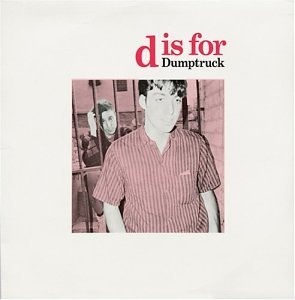
I’ve seen a few Dumptruck LPs in Boston-area record stores, but never for two bucks, so I snapped up this worn copy of their 1983 debut. A few of the songs sound like a less abrasive version of Mission of Burma, especially the great opener “How Come,” but usually they’re closer to the jangle of early R.E.M. than the art-punk of their fellow Massachusetts natives. Other dominant 1980s indie/college rock touchstones like the Feelies also apply, but there’s enough tension in the songwriting to let me look past the occasionally dry instrumental mix. I’d expected more of a jangle-pop sound, but the fringes of post-punk keep me interested.
This excellent article on Perfect Sound Forever relates the group’s label troubles: Bigtime Records tried to sell the band’s contract to a major label, despite that contract having already expired. The band and its lawyer reported this situation to the major, but Bigtime sued the group for five million dollars. While the band ultimately prevailed in court, being tied up in litigation sapped virtually all of their energy and killed any buzz from their successful 1988 album, For the Country. Its follow-up, Days of Fear, was recorded in 1991 but not released until 1995. Their first three LPs and a best-of have been issued on Rykodisc.
33. Joel R. L. Phelps & the Downer Trio – Inland Empires CD – Moneyshot, 2000 – $6

I’d talked about the wildly underappreciated Joel R. L. Phelps with a friend of mine prior to leaving for this trip, so finding a copy of Inland Empires, which she ranked as one of her favorites, was a nice semi-surprise. (Phelps is based in the Northwest, so I half-expected to find this CD.) I usually prefer Phelps’s more rocking, Crazy Horse–influenced albums, especially Blackbird, but Inland Empires proves that he's equally good at gut-wrenching ballads.
Inland Empires came out shortly after the death of Phelps’s sister, to whom the heartbreaking “Now You Are Found” is dedicated. The song traces the signposts of their relationship and I can’t fathom the level of care he put into the lyrics and performance. Fittingly, it’s the only Phelps original on the EP, accompanied by six covers of songs, including Fleetwood Mac’s “Songbird,” which is the second song from Rumours Phelps has covered. Silkworm recorded an enthusiastic version of “The Chain” for an early single during Phelps’s tenure in that group. The other five covers include excellent cover of the Go-Betweens’ “Apology Accepted” and songs by Townes Van Zandt, Iris Dement, and Steve Earle. I’d put off listening to this EP in its entirety for years, knowing the story about Phelps’s sister and how painful that song would be, but Inland Empires is a remarkably cohesive album for having six covers and one tremendously personal original.
Those interested in more Joel R. L. Phelps covers would be wise to track down the 2CD edition of Customs, which features a bonus disc with covers of Joy Division’s “Twenty Four Hours,” The Chills’ “Pink Frost,” and three others. Phelps also covered The Clash’s “Guns of Brixton” on his self-titled EP and Comsat Angels’ “Lost Continent” on Blackbird, to mention a few highlights. I’d love to hear new material from Phelps, who’s gone into hiding since Customs, but even another batch of covers would be quite welcome.
|
41. The Art of Noise - (Who’s Afraid of?) The Art of Noise! - Island, 1984
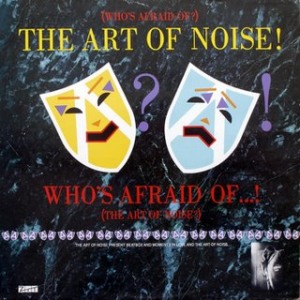
Why I Bought It: I came across the Art of Noise’s first two full-lengths in the dollar bin and, barring any particular knowledge of their catalog, opted to buy both of them rather than purchase only the lesser album. Typically I can pull enough information from the album sleeves to determine which album to grab, but the Art of Noise tries their damnedest to dodge specifics. My only prior knowledge about the band was that Anne Dudley collaborated with Killing Joke singer Jaz Coleman on the 1990 world music album Songs from the Victorious City, but despite my Killing Joke fandom, I do not own that release.
Verdict: With one prominent exception, (Who’s Afraid of?) The Art of Noise! suffers from the technological stamp of its era. Whereas early hip-hop can overcome reliance on rudimentary sampler techniques on the strength of the rapping, central placement of samplers and sequencers only highlights the Art of Noise’s compositional and melodic limitations. Not that AON is alone in this quandary—early Pop Will Eat Itself sounds just as dated, for example—but songs like “Beat Box (Diversion One)” and “Close (to the Edit)” depend on their production techniques sounding innovative to qualify as avant-garde experimentation. (At the very least, they do not feature Max Headroom.) “Close (to the Edit)” features an infuriatingly familiar sample that kept just out of memory until consulting Wikipedia; its stabbing sample was pulled from Yes’s “Owner of a Lonely Heart,” which AON member Trevor Horn produced. Anne Dudley’s fragmented vocals were later sampled for the Prodigy’s “Firestarter,” furthering this bizarre lineage. The samples featured on the other songs are harder to identify, but sound just as worn out twenty-four years later.
“Moments of Love” is the prominent exception to this rule. Presaging the late night grooves of DJ Shadow’s Endtroducing, the ten-minute highlight of the album tones down the jittery samples and trite melodies and focuses on supplementing its solid beat with tasteful keyboards and piano samples. Whereas a future generation of electronic artists could conceivably be inspired by songs like “Beat Box (Diversion One)” and “Close (to the Edit)” without actually sounding like them, the comparative restraint of “Moments of Love” allows it to act as both a structural guide and a sonic template for its progeny. The overall constitution of (Who’s Afraid of?) The Art of Noise! hardly encourages me to fast-track In Visible Silence in the RCR queue, but “Moments of Love” justify the two dollar expenditure on the albums.
42. Various Artists - Magic Eye Singles: Blue - Magic Eye, 1996
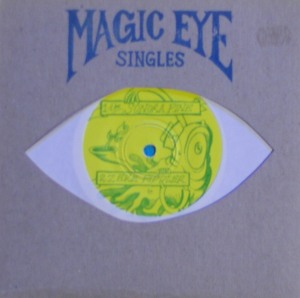
Why I Bought It: I have one other entry in the Magic Eye singles series, the aptly titled Gold (the titles are based on the vinyl color of the first pressing), which features Sonora Pine violinist Samara Lubelski, Team Xiaoping (Soo Young Park and William Shin of Seam), and Yesteryear. I bought that one a long, long time ago and can’t remember a damn thing about any of the tracks. This volume features the Sonora Pine, Zeke Fiddler, New Radiant Storm King, and Nord Express, so I grabbed it to hear the Sonora Pine song and to be able to say that I own something by New Radiant Storm King. The first single, which sadly I do not have, includes an exclusive June of 44 song named “1000 Paper Cranes.”
An added bonus, this single includes a photocopied postcard from David Berman of the Silver Jews. Responding to Magic Eye’s inquiry of his band’s availability for the series, Berman writes, “Thanks for asking but I think we’re monogamous with Drag City. Sure, we look at other labels on the street, every guy does, but we don’t sleep around. Good luck getting started.”
Verdict: Magic Eye states that their goal for the series was to “present unreleased songs that are different from those a band usually creates.” I read this tagline after listening to the Sonora Pine’s contribution, which features only Tara Jane O’Neil and Sean Meadows on guitar and the NYFD on sirens. This short bit of formless guitar squalor sounds nothing like either of the Sonora Pine’s albums, so they succeeded with the approach even if they failed to create an enjoyable song. The remaining three tracks are low-key attempts at stripped-down indie rock, with New Radiant Storm King taking an acoustic approach that saps their music of its energy. In a split-single context, I usually expect to gain a sense of what a band actually sounds like, so these four subpar tracks hardly justify subverting that proven approach.
43. Flying Nuns – “Disco Dancing Queen” b/w “Carousel of Freaks” - Summerville, 1992
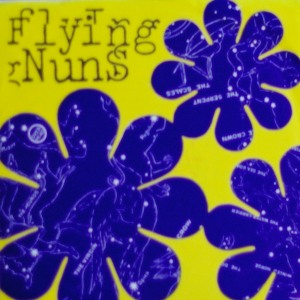
Why I Bought It: In a surprising coincidence, I listened to the Flying Nuns’ Pilot EP on my way up to Mystery Train Records in Gloucester today only to discover one of their early singles in a bin of mid-1990s indie rock seven-inches. I’d even thought about how little I’d listened to “Carousel of Freaks” (120 Minutes where are you?) since it falls on the less-played side B of the excellent Pilot EP, Flying Nuns’ only Matador release (they were dropped after the infusion of support from Capitol Records), and voila, it’s the flipside of this single. I’d never seen another non-Pilot release from the Flying Nuns before, although I should track down their 1998 self-titled EP and their 2002 full-length Everything’s Impossible Now These Days given my fondness for their catchy and meaty post-punk.
Verdict: These two songs feature a poppier side of Flying Nuns, with higher register vocals and less force from the rhythm section. “Disco Dancing Queen” has a predictable lightness given its title and the Galaxie 500-citing “Carousel of Freaks” fits with this mood better than the urgent “Submarine” or “Frank” would have. Now I just need to track down their later releases.
44. To Rococo Rot + D - “Smaller Listening” b/w “Numbers in Love” – Soul Static Sound, 2000
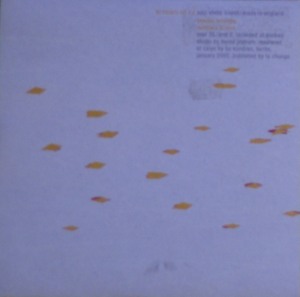
Why I Bought It: The graceful melody of “Die Dinge des Lebens” from To Rococo Rot’s 1999 full-length The Amateur View skips through my head every few months, sometimes inspired by its usage as the background for Björk’s “It’s in Our Hands” single. Yet I’ve never picked up any of their other material, despite seeing their collaboration with I-Sound (Music Is a Hungry Ghost) in used CD bins across the country.
Verdict: Whoops. Credit with Soul Static Sound abstract electronic artist D with the direction (or lack thereof) for these two songs, since these whirring, anti-melodic tracks couldn’t sound less like The Amateur View. Typically I’m embarrassed when I can’t tell the proper speed for a single, but these songs gave me no instrumental clues and aren’t interesting enough to merit concern. After flipping between 33 rpm and 45 rpm on both songs, I settled on the former speed since it annoyed me less. “Numbers in Love” is slightly better than “Smaller Listening,” but I can’t imagine pulling this one out of my singles box any time soon.
45. The C. S. Angels - Chasing Shadows - Island, 1986
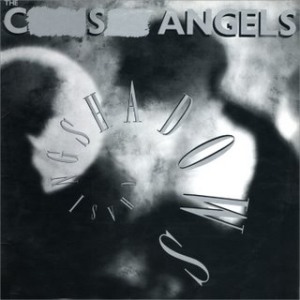
Why I Bought It: Silkworm’s cover of “Our Secret” led to my purchase of It’s History, a semi-legal reissue box set of the Comsat Angels’ Waiting for a Miracle, Sleep No More, and Fiction. Those three albums should be your starting point for the group, particularly the haunting post-punk of Sleep No More (which I finally tracked down on LP a few months ago), but former Silkworm member Joel R. L. Phelps’ cover of “Lost Continent” on Blackbird made me wonder about the group’s mid ’80s synth-pop phase. Phelps’ utmost sincerity and musical stoicism help his version of “Lost Continent” transcend its potentially cheesy lyrical content (“I’m looking for the same thing as you / The lost continent of love”), but tracking down the original on Audiogalaxy years ago only served to increase my appreciation of the cover. I couldn’t find the rest of Chasing Shadows online and stopped looking years ago after a picture disc for “Will You Stay Tonight” from 1983’s Land tempered my enthusiasm. Finding Chasing Shadows in the understock of Record Exchange in Salem, MA renewed my curiosity, so I snapped it up. After all, I own Killing Joke’s synth-driven albums—even the almost universally loathed Outside the Gate—so taking a chance on Chasing Shadows didn’t seem too preposterous.
Verdict: As it turns out, the Comsat Angels’ would-be sell-out synth-pop album is 1985’s 7 Day Weekend, given the inclusion of “I’m Falling” on the soundtrack to the Val Kilmer popcorn epic Real Genius. Chasing Shadows followed that record with a number of key changes—the group was forced to shorten their name in the United States to the C. S. Angels by a lawsuit from the Communications Satellite Corporation, dropped from Jive Records following a disappointing push to pop stardom with Land and 7 Day Weekend, and snapped up by Island Records at the behest of fan and snappy dresser Robert Palmer.
Yes, that Robert Palmer. He’s the album’s “executive producer” and contributes backing vocals for “You’ll Never Know.” Game over, right?
Not quite. Chasing Shadows lacks urgency and energy, but its dour moodiness does recall the pallor of their early post-punk records. The keyboards are minimal—hell, almost everything is minimal—and Robert Palmer’s guest vocal is barely noticeable. Whereas “Lost Continent” sounded out of place with regard to their earlier work, its teetering optimism is downright necessary on this album. Stephen Fellows seems worn down from the group’s troubles, singing “It’s a slave with a whip and it will beat you / Chasing shadows, running ragged, going round and round” on the title track, “I can’t wait for pennies from above” on “You’ll Never Know,” and “When every word fans the flames / All you can do is pray for rain” on “Pray for Rain.” Most of the eight songs linger past the five-minute mark and this nearly relentless melancholy grows tiresome by album’s end. Without the nervous twitches of early singles like “Independence Day” (although this is the Land version) or “Eye of the Lens” or the abbreviated hooks of their foray into synth-pop to vary the pace, the Comsat Angels get too bogged down in their atmosphere for their own good.
Chasing Shadows may not qualify as a true return to form, but it’s intriguing enough to justify the purchase. “The Thought that Counts,” “Lost Continent,” “Flying Dreams,” and “Pray for Rain” are individually solid blends of post-punk and moody new wave, but the band’s troubles fundamentally altered their constitution. The cover of the US version of Chasing Shadows has the “om” and the “at” in the band name scratched away, which seems apt given the missing elements of their sound.
|
|
One of my biggest concert-going regrets is passing up a Silkworm concert in Chicago back in November of 2004, less than a year before drummer Michael Dahlquist’s death from vehicular manslaughter the following July. While that tragedy could not have been anticipated, my fondness for Silkworm’s tremendously consistent catalog has grown by leaps and bounds since then, amplifying the ache of a missed opportunity. I’d also passed on my first chance to see Andy Cohen and Tim Midgett’s new group, Bottomless Pit, when I brushed off their opening performance for Magnolia Electric Company until the show had sold out. Had I known that their debut LP, Hammer of the Gods, would be such a revelation, I would’ve bought tickets long in advance. This time I took no chances; those tickets had been sitting above my laptop for months.
Former Codeine drummer and Come guitarist Chris Brokaw opened the show with a mix of acoustic and electric songs. I always enjoyed his vocal contributions to the latter outfit, especially “Shoot Me First” from Near Life Experience and “Recidivist” from Gently Down the Stream, so my attention was understandably piqued by a few of his more straightforward songs. Considering how frequently he’s played in town, especially at the nearby P.A.’s Lounge, I don’t have an excuse for waiting this long to see him perform. Next time I’ll yell out for one of those Come songs and pick up that limited vinyl pressing of his 2005 album Incredible Love.
My trip to the ATM down the block caused me to miss Brokaw sitting in with his fellow New Year members the Kadane Brothers, but the rest of the duo’s set was impressive enough without him. Despite owning Bedhead’s Transaction de Novo and having seen The New Year (with Silkworm/Bottomless Pit guitarist Andy Cohen) play a show with Crooked Fingers in Champaign, their music has never quite clicked, but I think this show finally won me over to their brand of melancholic minimalism. I credit a chair at the back of the Middle East Upstairs for allowing me to appreciate their subtle melodies and songwriting craft. I’m now planning on grabbing The New Year’s self-titled third LP when it’s released this fall.
During the Kadane Brothers’ final song, the members of Bottomless Pit (photos here) gradually ambled on stage and joined the melody of that song before seamlessly segueing to the excellent “Leave the Light On” as the Kadanes left the stage. Even without piano punctuation from its recorded version, “Leave the Light On” was a powerful opener, swelling with Midgett’s baritone guitar leads and Cohen’s nervous Telecaster twitches. Cohen’s “Dogtag” followed with its emotional “We saw our connection there / On the way down” chorus. The dynamic between Midgett and Cohen came to the forefront during the material from their new Congress EP. While each member usually takes the melodic leads on their own songs, Midgett’s exquisite “Red Pen” peaked with a dueling solo and Cohen’s “Fish Eyes” features similar interplay between the high-end of Midgett’s baritone guitar and Cohen’s Telecaster.
Even with a one-song encore, Bottomless Pit’s set seemed all too short. I needed more moments like Cohen’s raised voice on “Greenery,” Midgett’s enthusiastic delivery of “Sometimes you gotta take control” in “Reposession,” and Cohen’s pick-less guitar in “Dead Man’s Blues.” The consolation prize for such tantalizing economy was a copy of the Congress EP, which certainly merits its own post.
|
|

